The second edition of the international festival "Kids' Art Morocco" in Ouled Teima 2024
Under the slogan: Childhood Creativity - A Bridge to Cultural Openness
Kids' Art Morocco 2024
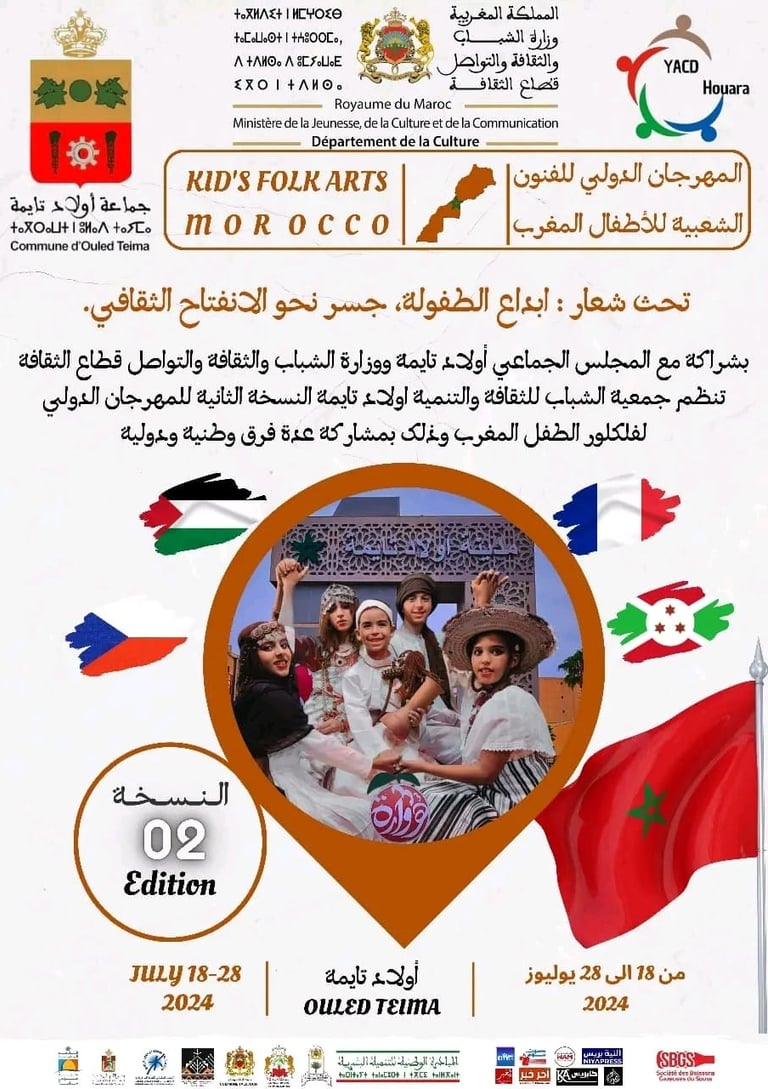

On the auspicious occasion of the 25th anniversary of His Majesty King Mohammed VI's ascension to the throne of his glorious ancestors, the city of Oulad Teima hosted the second edition of the International Children's Folk Arts Festival from July 18 to 28, 2024. Organized in partnership with the Oulad Teima Municipality, the Ministry of Youth, Culture, and Communication (Culture Sector), and the National Initiative for Human Development, the festival was held under the theme "Childhood Creativity: A Bridge to Cultural Openness," showcasing a beautiful blend of authentic Moroccan traditions and global artistic performances.
The festival featured a diverse range of participants from across Morocco, including groups from Laayoune, Tiznit, Ouled Teima, Tan-Tan, and Tafraoute. Additionally, international groups from Palestine and the Czech Republic added an international flair to the event. The festival was a vibrant celebration of cultural diversity, offering children the opportunity to learn about different cultures, exchange knowledge, and foster a spirit of tolerance and mutual respect.
Key highlights of the festival included:
A rich cultural tapestry: The festival brought together Morocco's rich cultural heritage, represented by groups from various regions, and global cultures, showcased by the Czech circus troupe and the Palestinian Dabke dance group.
Cultural exchange: Children had the chance to discover diverse cultures, share experiences, and learn from one another, promoting intercultural understanding.
Supporting local talent: The festival provided a platform for local groups to showcase their talents to a wider audience, encouraging artistic creativity among children.
Boosting cultural tourism: By highlighting the city of Oulad Teima, the festival contributed to its growing reputation as a cultural tourism destination.
The festival was a resounding success, leaving a lasting impression on participants and attendees alike. It served as a testament to the power of culture to unite people from all walks of life and inspire future generations.
The Participating National Teams
Houara Children's Troupe
The Houara Children's Troupe is a group of nine children from the city of Ouled Teima, coming from various places. Under the leadership of Mohamed Amin Al-Haskouri, they aim to promote the local cultural heritage of the city on both national and international levels.
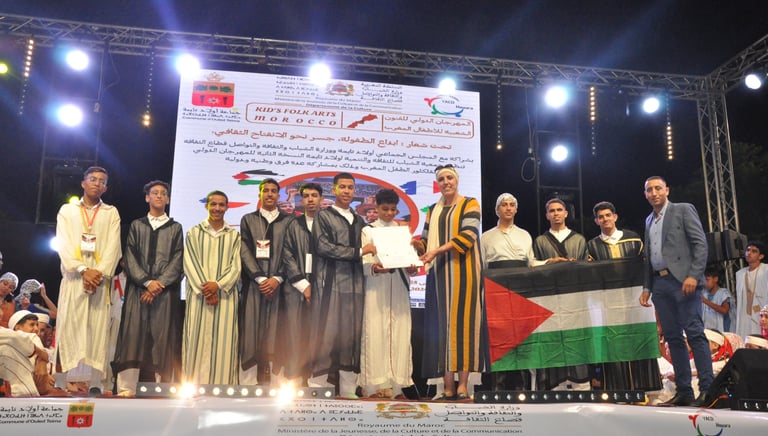

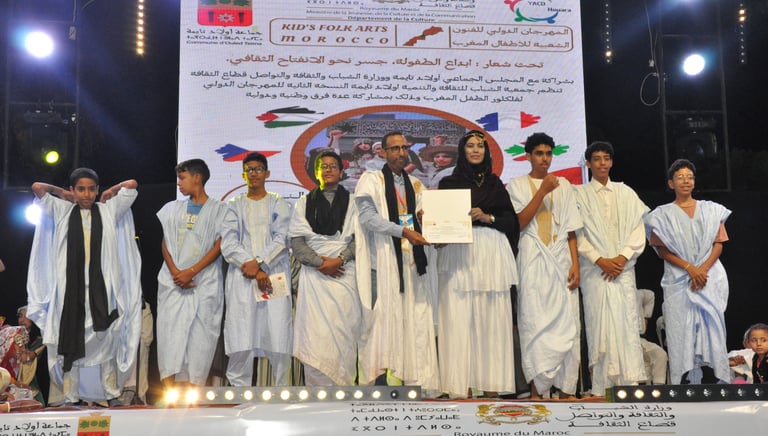

The Laayoune Children's Troupe is composed of students from the Al-Nida Educational Schools—both middle and high school levels—in the city of Laayoune. The troupe consists of eight children under the guidance of their mentor, Ms. Iman Akinina, along with their bus driver, Mr. Nour Eldin Hilali. They came with a single goal: to represent the southern regions by showcasing their cultural and artistic heritage.
Laayoune Children's Troupe
Tiznit Children's Troupe
The Tiznit Children's Troupe consists of nine children from the Multiple Intelligences Center in Tiznit, led by their leader, Mr. Ahmed Sayh. They represent the heritage of Tiznit city through the traditional dance of Ahwash Adbarim.
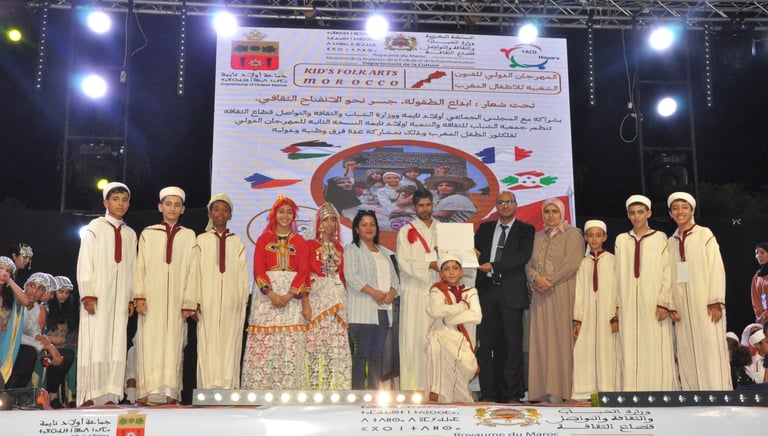

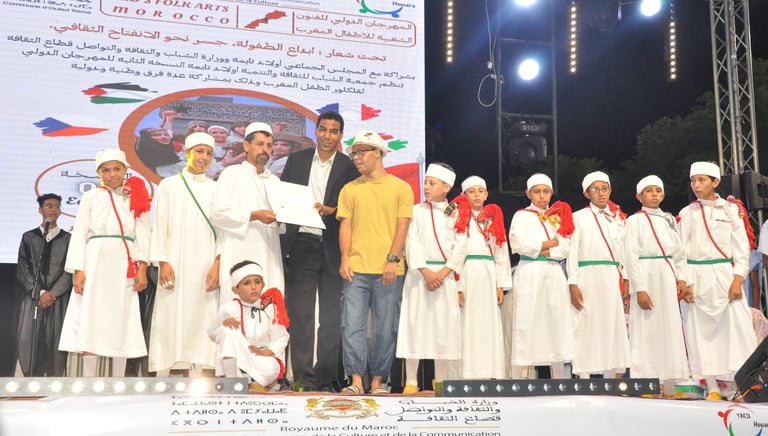

The Teskioin Children's Troupe is from the Adia Ahwash Association in Teskioin Ouzlida, part of the Sbit Tafraouten community. The troupe consists of nine children under the leadership of Abdullah Andjarn, Omar Ajniten, and Abdulwafi Beja. Their goal is to represent and promote the heritage of Ahwash Teskioin on a global scale.
Teskioin Children's Troupe
Tinzert Children's Troupe
The Tinzert Children's Troupe is composed of seven girls from the Tinzert community, led by Ms. Ghazlan Harous. They came to showcase the Tinzert Ahwash dance at the International Festival of Folklore Arts for Children in the city of Ouled Teima.
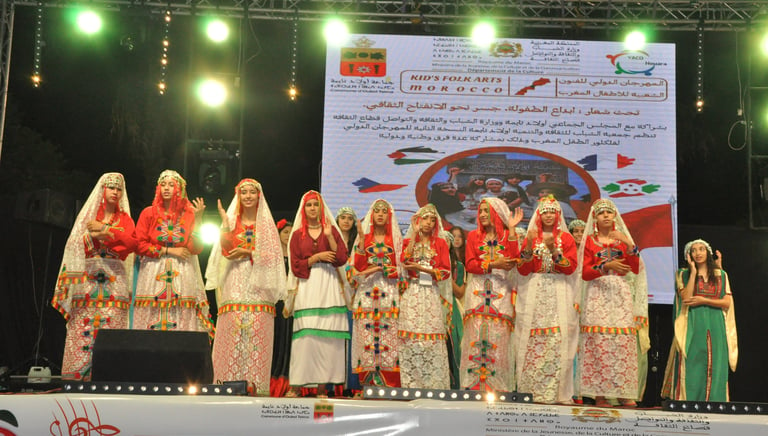

Participating International Groups
Palestinian Children's Troupe
The Palestinian Children's Troupe is from the Folk Art Center in Palestine. The team consists of ten children, led by Ms. Marah Nazzal. Their journey from Palestine to Morocco was challenging in many ways, but their goal remained the same: to showcase Palestinian heritage through the traditional folk dance of Dabka.
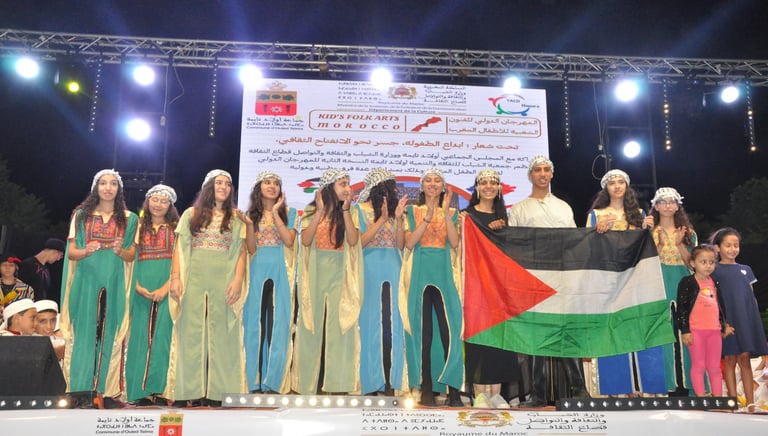

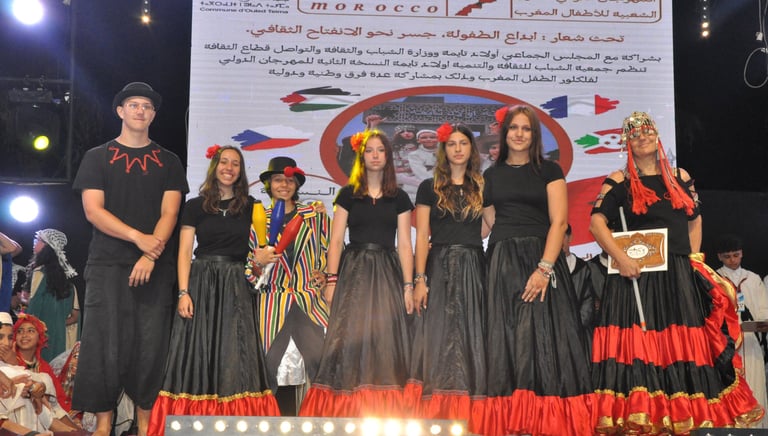

The Children's Troupe of the Czech Republic consists of six children representing three different European countries: France, the Czech Republic, and Poland. Under the leadership of Ms. Petra Plachtanski, these children have chosen circus arts to showcase and promote on a global level.
Children's Troupe of the Czech Republic
First Day:
July 18, 2024
The cultural complex in Oulad Taima hosted a distinctive and lively celebration, where the participating teams in the festival received a warm welcome that reflects the richness of Moroccan traditions. In an atmosphere filled with joy and hospitality, the teams were greeted in a traditional manner that highlighted Moroccan generosity, with milk and dates offered to them—two authentic symbols of kindness and hospitality in Moroccan culture.
The festive atmosphere continued with stunning performances from each participating group, showcasing unique dances that reflect their cultural heritage and highlight the artistic diversity found across various regions of Morocco. These performances added a touch of magic and beauty to the event, making the festival an unforgettable experience for all attendees. The evening was vibrant with colors and rhythms, as traditional music blended seamlessly with dance movements, allowing the audience to enjoy exceptional moments full of energy and brilliance.
The participants embarked on a special visit to Villa Lemon, where the atmosphere was filled with excitement and anticipation. Upon their arrival, they had a wonderful opportunity to enjoy viewing a variety of animals, which amazed and impressed everyone, especially the children who showed great interest in the animals present.
In addition, the participants enjoyed the beauty of the picturesque nature surrounding the villa. The tour through its gardens had a positive impact on the children's spirits, who spent joyful and fun-filled times wandering among the green spaces and exploring every corner of the place.
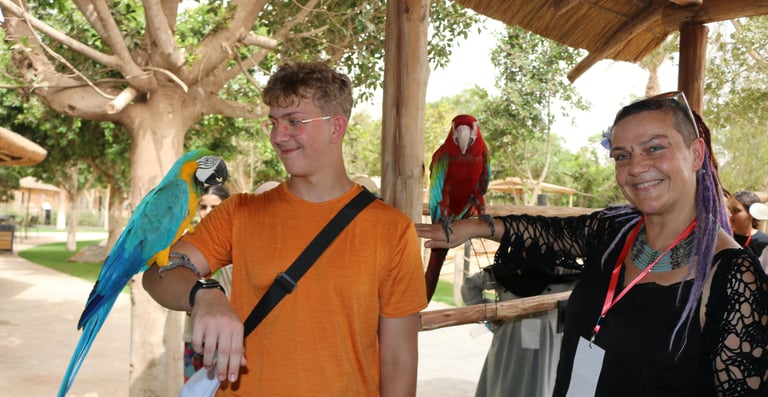

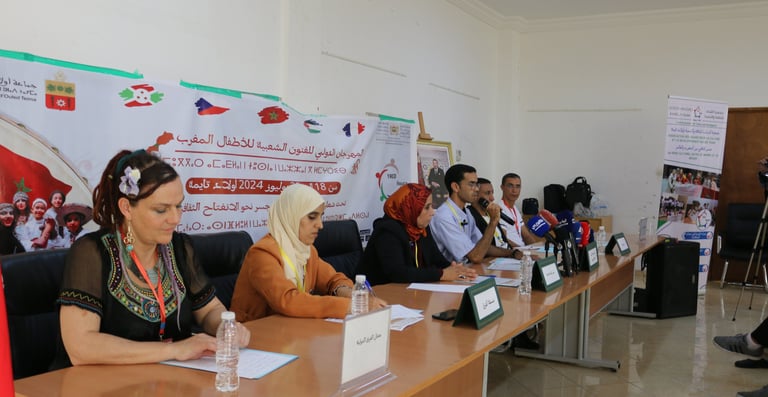

Second Day:
July 19, 2024
The festival carnival in Oulad Teima kicked off today with a vibrant atmosphere, attracting important figures and numerous visitors. The inauguration featured an impressive parade showcasing teams from various Moroccan regions and foreign countries, each presenting folkloric performances that highlighted their unique cultural diversity and traditions. The blend of traditional costumes and folk melodies created a captivating experience, allowing the audience to embark on an artistic journey that celebrated multiple cultures and values of coexistence.
Following the parade, participants and guests gathered in Hope Square for the festival's official opening evening. This event included special speeches from organizers and prominent figures, who expressed their joy at the carnival's success and its significance in strengthening cultural bonds among nations. The speeches underscored the festival's role in promoting cultural heritage and facilitating exchange between participating countries.
As the evening progressed, the folkloric performances captivated the audience with their creativity and diversity. The blend of music and traditional dance created a joyous atmosphere in Hope Square, where attendees engaged enthusiastically with the performances. This memorable opening evening not only marked a successful start to the festival but also set the tone for a distinguished celebration of culture and artistry.
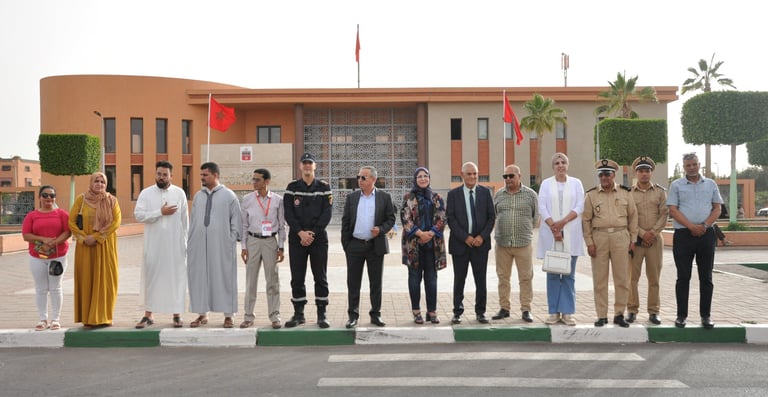

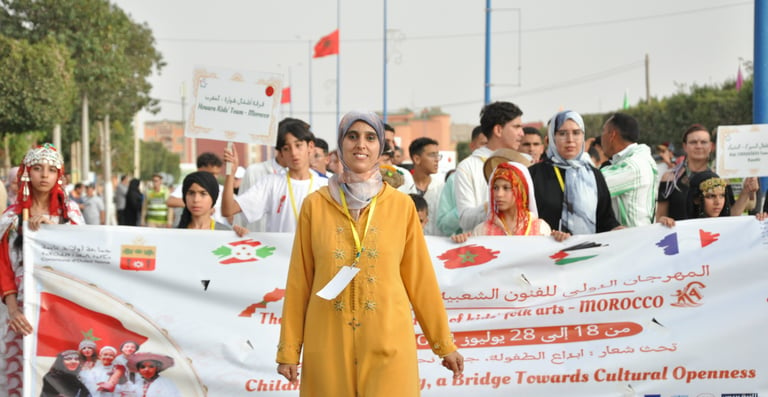

Third Day:
July 20, 2024
The participating teams traveled to the town of Meni’zla, where they were warmly welcomed by enthusiastic local residents. The hospitality displayed reflected the generosity typical of the area's inhabitants. In the town's heart, teams performed mesmerizing folkloric dances, showcasing traditional colors and decorations amid a festive atmosphere. These performances transcended mere entertainment; they conveyed cultural messages rich with the essence and diversity of heritage, sparking excitement and admiration among the locals. This interaction fostered a meaningful cultural exchange, creating moments of joy and camaraderie that left a lasting impression on everyone involved.
After the performances, the group embarked on an exploratory tour to the picturesque village of Agadir Ouanzezn. This journey provided a chance to immerse themselves in the region's breathtaking natural beauty. As participants wandered through the scenic landscapes, they enjoyed a tranquil atmosphere, engaging in conversations and capturing memories through photographs. The vibrant colors of the surroundings formed a stunning backdrop, enhancing the charm of the experience and leaving everyone in awe of nature's artistry.
The day concluded with a traditional lunch in the heart of nature, where participants savored specially prepared dishes. This gathering allowed them to relax and reflect on the day's beauty, sharing stories and experiences that deepened their bonds. The combination of natural beauty and shared meals added warmth and friendship to this unique journey, making it a memorable part of the festival's celebrations.
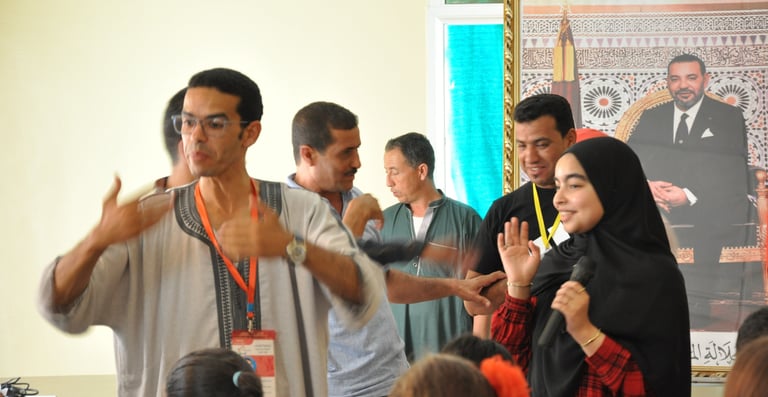

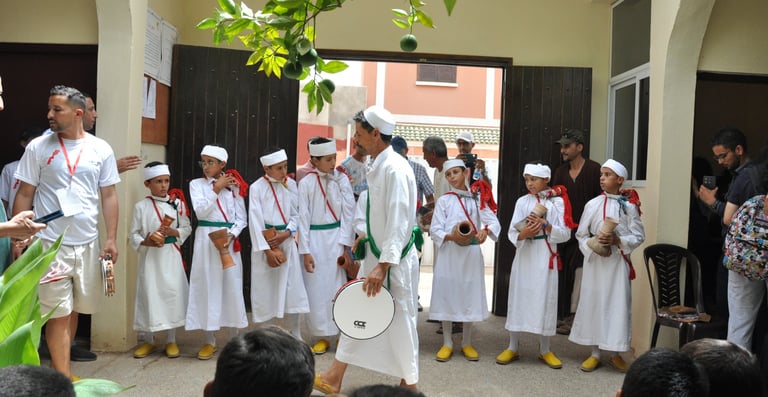

Fourth Day:
July 21, 2024
Preparations intensified as the participating teams engaged in rigorous training sessions to create a remarkable closing performance for the festival. These rehearsals aimed to blend various cultures and artistic styles, showcasing the cultural fusion and diversity that defined the event. Under the guidance of skilled trainers, the teams focused on coordinating their movements and harmonizing their rhythms and music to reflect the theme of unity in diversity. The atmosphere buzzed with enthusiasm and determination, as everyone eagerly anticipated a finale that would encapsulate the spirit of cooperation and cultural interaction.
After a day filled with rehearsals, the participants set off on an exploratory tour of Oulad Teima. This excursion offered them a chance to familiarize themselves with the host city, allowing them to explore its landmarks and immerse themselves in local culture. The tour provided a refreshing break from the intense preparations, enriching their understanding of the community that welcomed them.
As they wandered through the city's vibrant streets, participants not only appreciated the historical and cultural sites but also forged deeper connections with each other and the local residents. This experience added a meaningful layer to their journey, enhancing their overall festival experience before the grand finale.
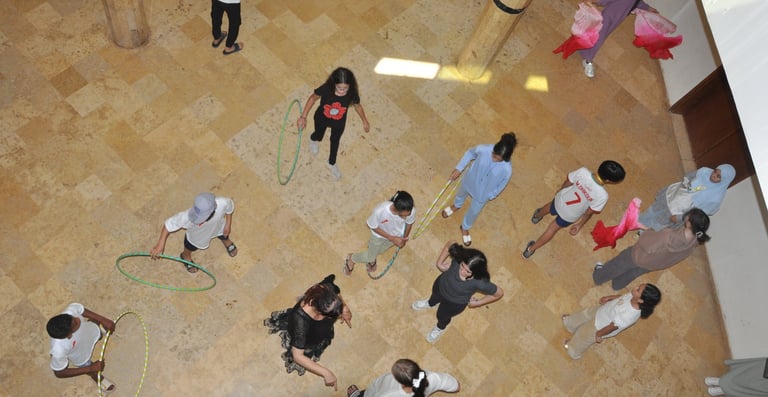

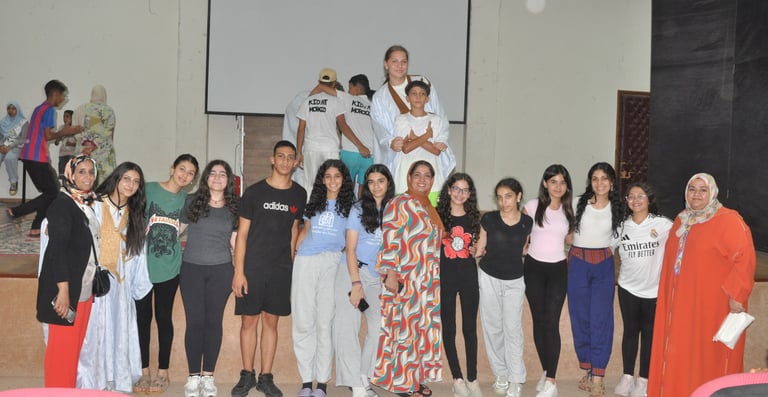

Fifth Day:
July 22, 2024
After resuming the training workshops, which focused on preparing for the final performance, the participants continued working diligently and attentively, concentrating on achieving optimal coordination between the different teams and presenting an integrated show that reflects the cultural diversity of the festival. After completing the rehearsals, they headed for lunch, and following a short break, the participants went to the “GREEN PARK” café and pool to enjoy some leisure and relaxation time. The participating children had a wonderful time swimming and enjoying the relaxing atmosphere of the place. This visit was an opportunity to relieve stress and regain energy after a day filled with preparations and rehearsals, as they enjoyed relaxation and social activities in a pleasant environment.
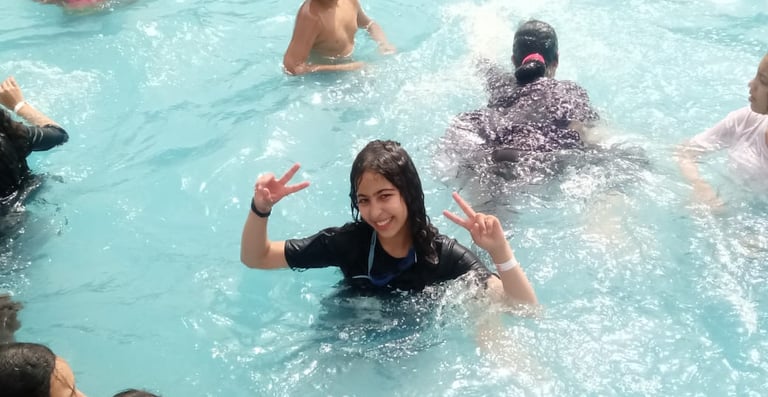

Sixth Day:
July 23, 2024
fter completing the rehearsals, the performance spaces in Shararda Square were prepared to host the second cultural evening of the festival. The preparations were precise and intensive, with the square being set up perfectly to accommodate the folkloric performances and provide a comfortable and suitable environment for the audience. During the second cultural evening, the participating teams presented a variety of folkloric performances that reflected the diversity of culture and heritage, adding a touch of joy and liveliness to the event. The performances ranged from traditional dances to folk music, captivating the audience’s attention and earning their admiration.
The evening saw a large turnout of residents from the Shararda neighborhood, who flocked to enjoy the shows and partake in the celebrations. Several prominent figures from the city also attended the event, adding a special significance and highlighting the importance of the occasion. The audience interacted enthusiastically with the performances, making the second cultural evening a wonderful moment within the festival, where everyone enjoyed the distinguished atmosphere of culture and art.
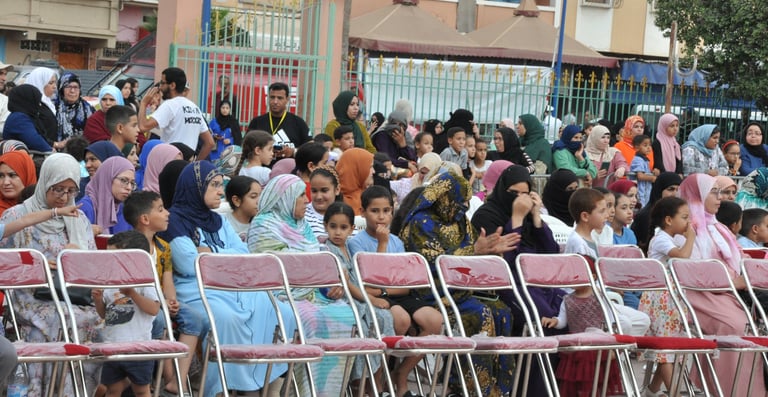

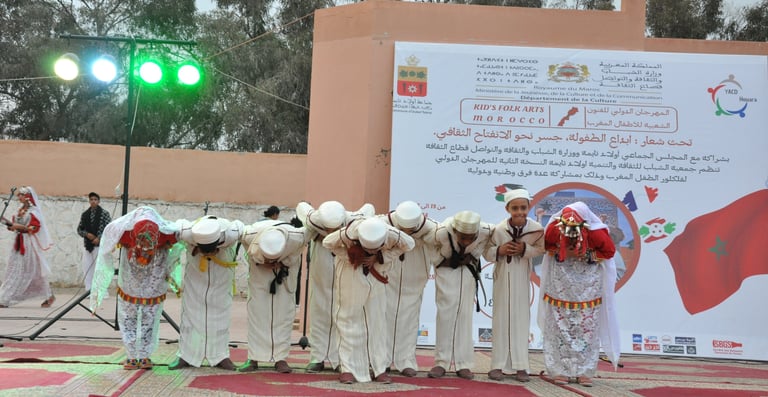

Seventh Day:
July 24, 2024
In coordination with the local community of Talgoujant, a comprehensive visit was organized featuring artistic activities, field visits, and workshops. This visit provided an opportunity for cultural interaction and exchange with the residents, adding an enriching dimension to the participants' experience.
Despite the high temperatures, which did not hinder enjoyment of the activities, the participating children showcased their artistic performances as expected. A series of artistic activities included folkloric and musical presentations, where the children displayed significant enthusiasm and creativity, impressing the local audience.
The visit also included field tours around the community, allowing participants to explore its natural and cultural landmarks. Additionally, workshops aimed at enhancing artistic skills and facilitating knowledge exchange between participants and community residents were held. Overall, the visit was enjoyable and beneficial for everyone, reflecting the positive spirit and collaboration between local teams and participants, and contributing to strengthening cultural ties and deepening understanding of cultural and environmental diversity.
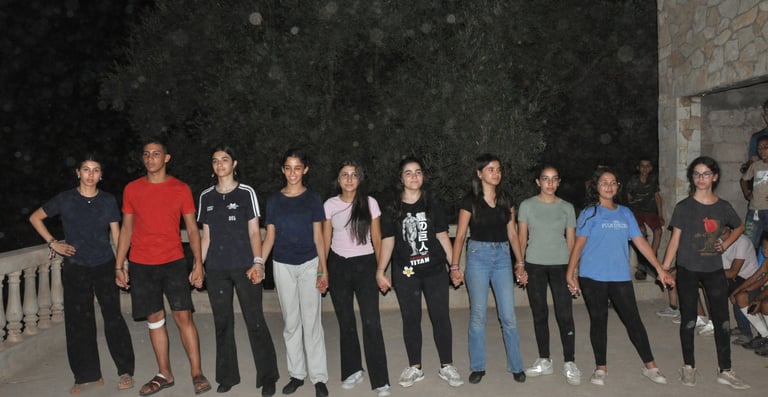

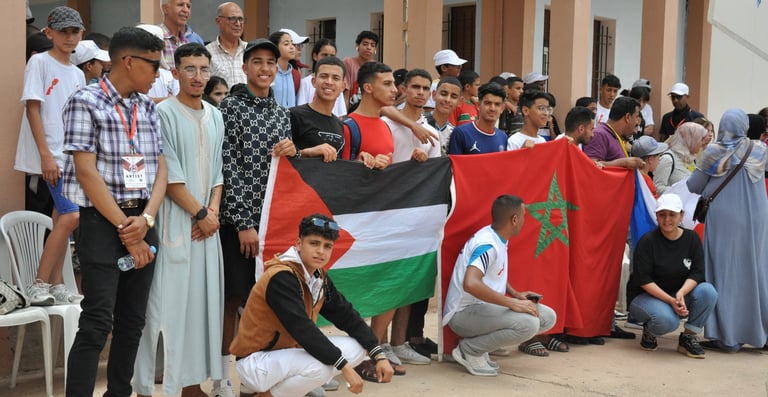

Eighth Day:
July 25, 2024
After the day's training sessions, the festival management organized an international cooking competition in the evening, with all teams participating by showcasing unique dishes that reflected the diversity of Moroccan and global cuisine. This event provided an opportunity to highlight the variety of foods representing different cultures, adding a new dimension to the festival activities.
Each team prepared special dishes that represented their region or country, focusing on flavors and recipes that reflected their culinary heritage. The displayed dishes were diverse and delicious, characterized by intricate details that showcased the effort put into their preparation and aesthetic presentation.
The competition also included evaluations by a specialized judging panel, alongside tastings from the audience, who enjoyed unique and new flavors. The atmosphere was filled with excitement and anticipation, as participants and spectators exchanged comments about the dishes and their experiences with global cuisine. This competition served as a celebration of cultural diversity through the art of cooking, demonstrating how food can act as a bridge for cultural communication and understanding among different peoples.
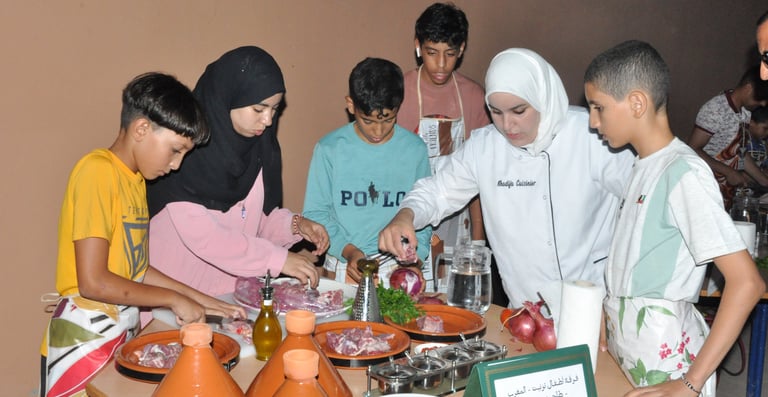

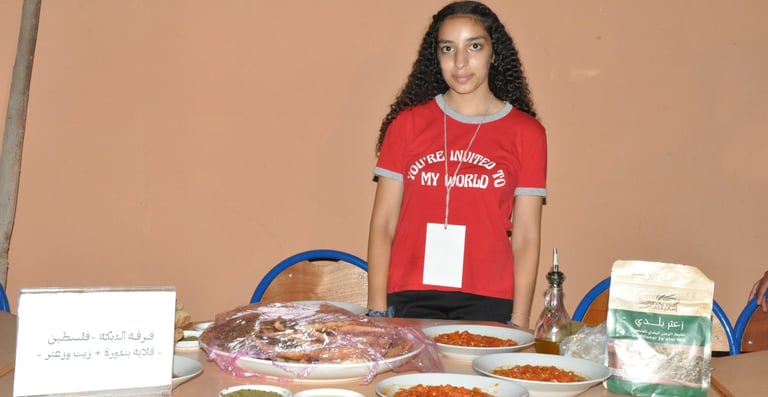

Ninth Day:
July 26, 2024
As usual, the day began with rehearsals for the festival's closing performance. In the evening, the participating teams embarked on an exploratory trip to the historic city of Taroudant, providing an opportunity to discover its rich cultural heritage. Participants enjoyed a tour of the city, exploring traditional markets, the old city walls, and historical landmarks that reflect the beauty and authenticity of Taroudant.
After visiting Taroudant, everyone moved on to the community of Tinzirt, where they visited the Youth Center and the Olive House. At the Youth Center, they engaged with local activities and learned about cultural and educational programs aimed at the region's youth.
At the Olive House, modern techniques used in olive oil production were showcased. The visit offered insights into the stages of oil production, from harvesting to packaging, highlighting technological innovations that enhance product quality. This educational experience was valuable for participants, as they learned about the significance of olive oil in local culture and the advancements that improve this essential industry.
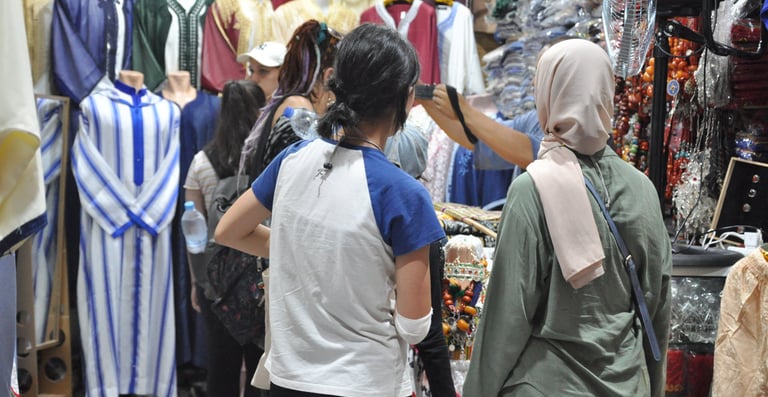

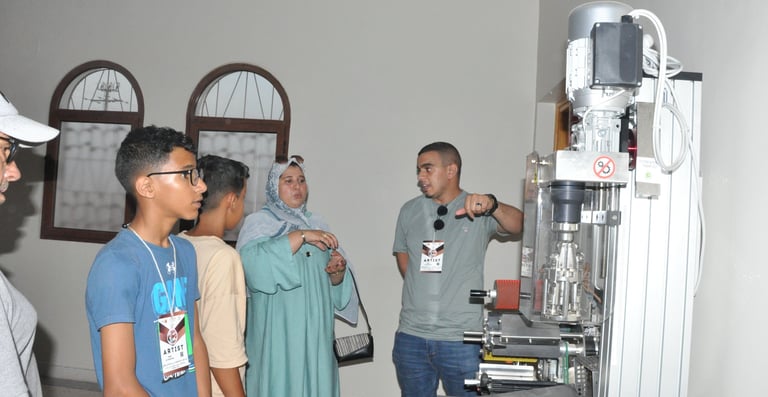

Tenth Day:
July 27, 2024
In the morning, participants resumed intensive training in preparation for the festival's closing night. The focus of the rehearsals was to coordinate and ensure a distinctive performance that showcased the various cultures and arts featured in the festival. Under the guidance of professional trainers, the teams worked diligently on final details to guarantee the success of the closing show.
After completing their training and enjoying lunch, participants headed to Agadir Beach for some relaxation and entertainment. This beach visit provided a perfect opportunity to relieve the pressures of preparation while enjoying the beauty of the sea and sand. Participants enjoyed swimming and various beach activities, using this time to unwind and mentally prepare for the closing night.
In the evening, the teams gathered for a significant surprise event. The highlight of the day was a simulated Moroccan wedding, organized in coordination with the festival management and the Oulad Taima GREEN PARK community. This event showcased the authentic traditions and customs of Moroccan weddings in a festive and artistic manner.
The bride and groom were represented by a Palestinian boy and a Czech girl, adding an international touch that reflected the festival's spirit of cultural unity. Dressed in traditional Moroccan attire, the ceremony followed all the customary wedding rituals, from the procession to the henna ceremony and the gift-giving traditions.
The wedding attracted a wide audience, including prominent figures from the city, local families, and festival participants. The atmosphere was filled with joy and celebration as everyone enjoyed this theatrical wedding that beautifully represented the richness and diversity of Moroccan culture.
This event was not just a performance; it fostered cultural exchange between participants and visitors, allowing for a closer understanding of Moroccan wedding traditions in a joyful and creative setting. Additionally, the Youth Association for Culture and Development in Oulad Taima honored both Mr. Mohamed Bouhdoud Boudlal, the parliamentary representative for Taroudant South, and Ms. Nadia Bouhdoud, the president of the Oulad Taima community, during this cultural wedding, recognizing their diligent efforts to promote local development and support for the region's culture on national and international levels.
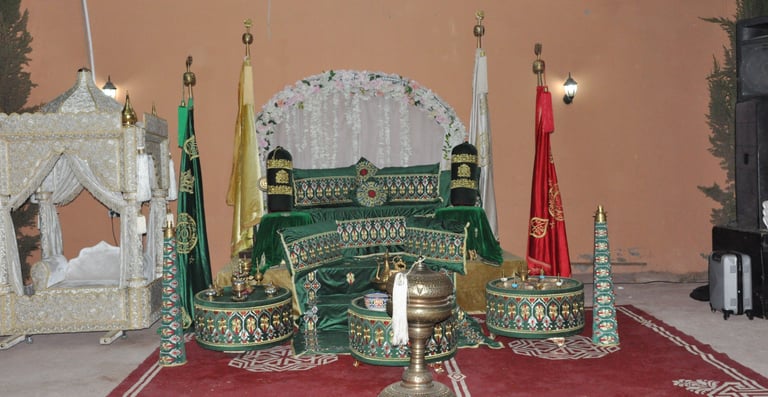

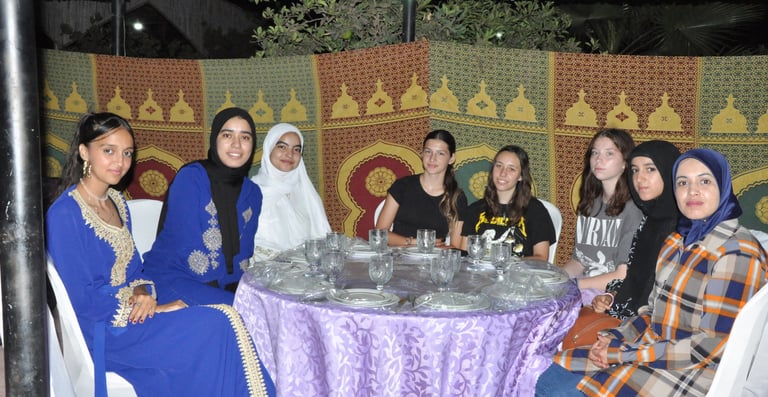

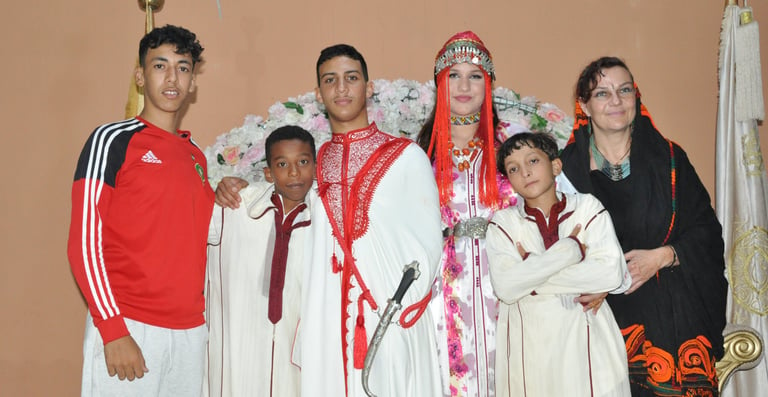

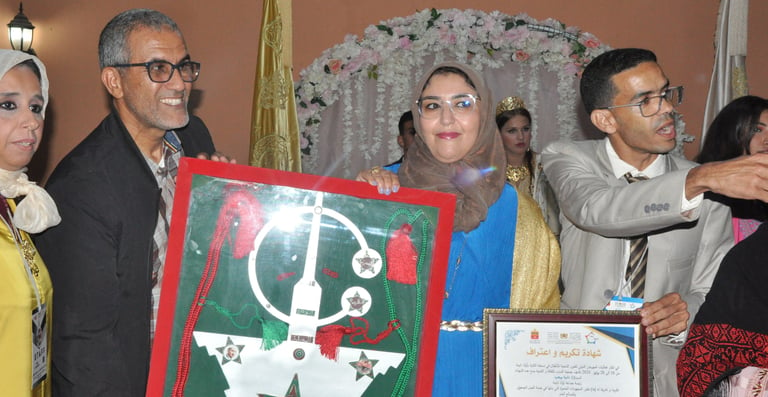

Eleventh Day:
July 28, 2024
On the final day of the festival, an atmosphere of focus and dedication prevailed as the participating teams put the finishing touches on their final presentations. Intensive rehearsals continued to coordinate performances and ensure that the closing ceremony would showcase the efforts of the previous days and the diversity of participating cultures.
In Hope Square, the closing ceremony commenced with speeches from the president of the Youth Association for Culture and Development, the festival director, and several important figures. A video montage summarizing all the festival days was presented, followed by a spectacular performance that brought together all the participating teams in a stunning artistic display. The performance highlighted the fusion of different cultures, with dances and music from around the world merging into a single show that showcased the rich artistic and cultural heritage of the groups. This artistic presentation was a vibrant expression of the festival's spirit, uniting various peoples in an atmosphere of unity and understanding.
The ceremony attracted a large audience, including notable figures who had followed the festival from its inception. The closing event celebrated the integration of diverse cultures, making the festival an unforgettable experience for everyone involved.
At the end of the ceremony, certificates of appreciation were awarded to participants and volunteers, expressing gratitude for their efforts and contributions to the success of this prominent cultural event. These certificates symbolized recognition for the vital roles each individual played in making the festival a unique and memorable experience.
The festival also honored several political figures and community leaders for their outstanding efforts and continuous support of festival activities. This recognition acknowledged their contributions, whether through active participation or assistance in organizing and ensuring the success of the events.
Additionally, traditional gifts were presented to the leaders of the participating teams as mementos, celebrating the rich Moroccan heritage. This recognition added a touch of respect and acknowledgment for the valuable contributions that helped strengthen cultural and social ties among participants, solidifying the festival's position as a cultural event that embodies both excellence and diversity.
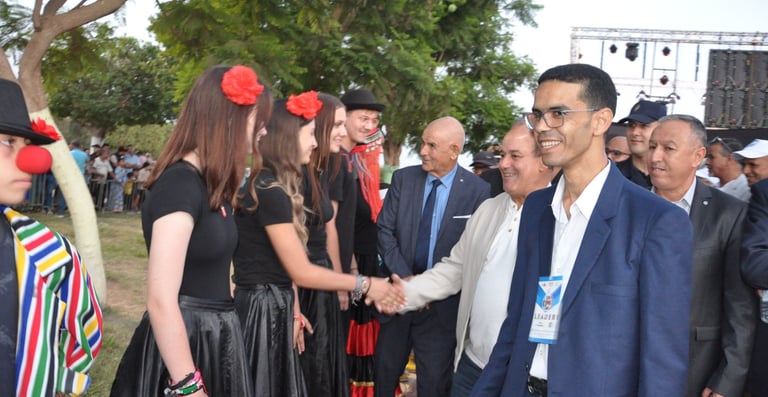

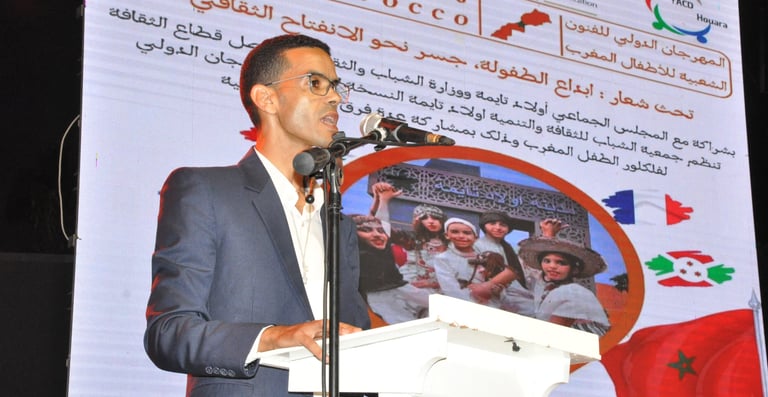

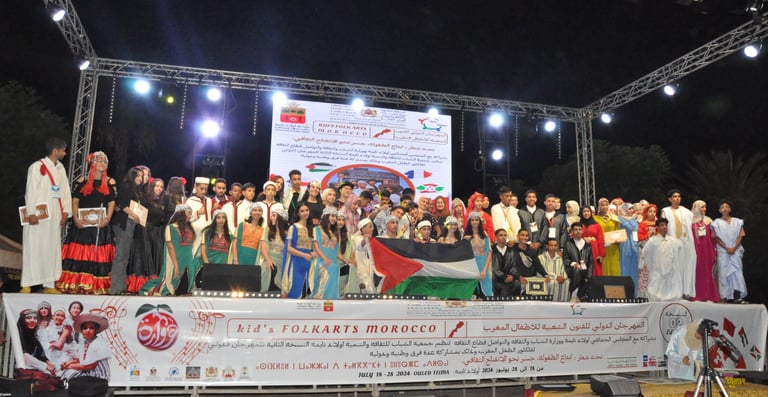

Conclusion
The festival achieved significant success in terms of organization, cultural interaction, and the execution of planned activities. It served as a true platform for cultural and artistic exchange among various peoples, contributing to the creation of new bridges of understanding and mutual respect. With minor improvements, this festival could become a model for organizing international cultural events.
Well-Organized Structure
The festival was characterized by effective organization and management, providing a suitable environment for hosting various activities. Attention was given to details such as logistical preparations and the technologies used in the performances.
Diversity of Activities
The festival featured a wide array of activities, including folkloric performances, training workshops, and field visits. This diversity enriched the experiences of both participants and the audience, making the event more engaging.
Cultural Exchange
The festival successfully achieved its primary goal of enhancing understanding and closeness between different cultures. Through collaborative activities like the simulated Moroccan wedding and cooking competitions, it highlighted diverse cultural heritage and traditions.
Audience Engagement
The events saw a large audience turnout, with positive interactions from attendees who enjoyed the performances and engaged enthusiastically.
Recognition of Participants
The presentation of certificates of appreciation and the honoring of prominent figures were notable steps that reflected the recognition and gratitude for everyone's efforts, adding extra value to the festival.
Overall, the festival not only celebrated cultural diversity but also fostered a sense of community and collaboration among participants and visitors alike.
